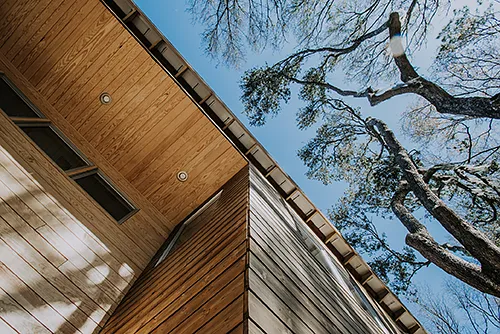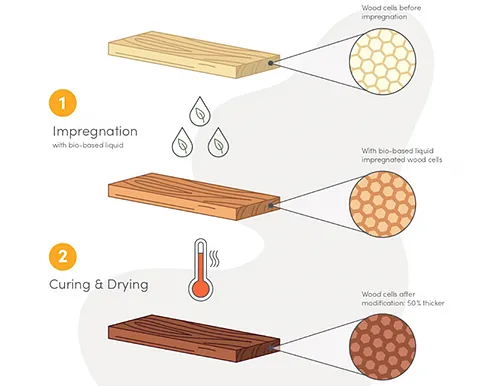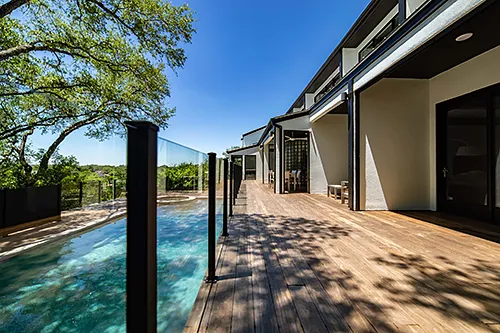Durable Wood for Exterior Applications
by Rachel Lyon, Editorial Director for Direct from the Designers
Many people love the look of wood on their homes, but they’re afraid to invest in a natural material that can be damaged by the elements. And very few of today’s homeowners have the time or skill to perform regular maintenance and maximize the lifespan of exterior wood. That’s why synthetic and composite alternatives have grown so popular, but they don’t provide the same appeal as natural wood and eventually end up as plastic waste in landfills. If you’d like an eco-friendly, real-wood solution that performs well through the seasons without upkeep, look into modified wood!

Why Wood Is Modified
Not all wood is equal when it comes to sustainability and durability. In fact, there’s usually an inverse relationship between the two—the wood species that replenish more quickly and are the most sustainable to harvest are less robust than the slower growing species generally preferred for outdoor use. You’ve probably heard professionals sing the praises of tropical hardwoods, but between the long maturation time of such trees, the shipping distance to bring them between continents, and the delicate ecosystems they help support in some of the most vulnerable rainforests on the planet, it’s best to leave them alone.
Kebony’s modified wood starts with Forest Stewardship Council (FSC) certified pine. It’s a fast-growing species and forests are managed to ensure they’re harvested sustainably. This is great news on the environmental front, but pine’s relative softness doesn’t make it the best choice for home exteriors. Enter the next step—modifying this wood to withstand the challenge!

The Modification Process
Kebony wood is just that—wood. It isn’t a composite that uses a percentage of wood fiber, like many other “eco-friendly” materials. So, if you’re serious about using a natural product, make sure to look at the whole composition.
After harvesting and milling trees, Kebony processes whole planks in two steps: impregnation and curing. During impregnation, furfuryl alcohol is infused through the board. This naturally occurring organic compound is produced through fermentation—something useful that comes from biomass discarded during farming. Furfuryl alcohol swells the wood’s cell walls to make the board dimensionally stable, so it won’t warp with exposure to moisture and changing temperatures. Curing heats the wood to lock in this cellular structural change permanently. The result is a hard, stable board with a long lifespan—all without using any toxic chemicals. Kebony wood is completely safe for you, your home, and your environment!

Durability Now, Natural Decomposition Later
When it comes to home finishing products, many people choose composites in an effort to make things last longer. Plastic alternatives look and feel cheap, though, and they still eventually wear out. When that happens, all that material inevitably pollutes the environment—whether it makes it to a landfill or not, petrochemical products will leach toxins and break down into microplastics.
Natural materials are much better for the environment because they can break down completely without creating persistent, man-made waste. Kebony wood is no exception—it is guaranteed and warrantied against rot for up to 30 years for decking and 35 years for cladding, but when it does eventually reach the end of its usable lifespan, it will decompose back to the earth. Compare that to vinyl, the most popular material for exterior finishes; it typically lasts 20-40 years before needing replacement, at which point the old stuff becomes garbage. For those who want to minimize their ecological impact, there’s no comparison.
If you’re in the market for beautiful decking and/or cladding, Kebony has you covered with extremely durable, real-wood products you can feel good about! Their products are available from local lumberyards and can be purchased directly, too. In either case, you and your contractor will appreciate how quick and easy it is to install Kebony decking and cladding!
BROWSE HOME PRODUCT ARTICLES
- Creating a Spa-Like Master Bathroom »
- Designing a Water-Efficient Bathroom »
- Design a Modern Bathroom »
- View All Bathroom Articles »
- Building a New Home »
- Building a Duplex »
- Finding the Right Home Builder »
- View All Building Tips Articles »
- Adding the Right Columns»
- Decorative Touches for Your Interior»
- Shutters for Every Architectural Style »
- View All Columns & Millwork Articles »
- How to Use Specialty Laminates »
- Decorative Touches for Your Home's Interior
- View All Countertops and Surfaces Articles »
- What Goes Into a Great Deck? »
- Decorative Touches for Your Home's Interior »
- View All Decking Articles »
- Choosing Glass for Your Entry »
- Stylish Personas for Your Front Door »
- Using Sidelites and Transoms »
- View All Door Articles »
- Choose Siding for Your Region »
- Get the Most Out of Exterior Paint »
- Mixing Siding to Define Your Exterior »
- View All Exterior Articles »
- Finding the Right Home Builder »
- The Appeal of Small House Plans »
- Choosing the Perfect Floor Plan »
- View All Finding a Home Plan Articles »
- Colorful Flooring for Your Home »
- Designing With Different Widths»
- Chic, Neutral, Gray Flooring »
- View All Flooring Articles »
- Garage Doors That Add Curb Appeal »
- Caring for Your Garage Doors »
- Benefits of Insulated Garage Doors »
- View All Garage Door Articles »
- Reclaimed Products for Your Home »
- Building a Green and Stylish Home »
- Benefits of Building with SIPS »
- View All Green Building Articles »
- Cool Gadgets for Your New Home »
- Creating a Hi-Tech Home »
- Efficient Gifts for New Homeowners »
- View All Home Electronics Articles »
- Improve Your Home's Air Circulation »
- How to Improve the Air Circulation in Your Home »
- View All HVAC Articles »
- Bedrooms Designed for Sleep »
- Selecting a Fireplace for Your Home »
- Crafting a Luxurious Master Suite »
- View All Interior Design Articles »
- Design the Perfect Outdoor Space »
- Dive into a Beautiful Pool »
- Design a Sizzling Outdoor Kitchen »
- View All Outdoor Living Articles »
- Apps to Help You Pick Paint Colors »
- Create the Perfect Mood with Paint »
- How to Read the Color Wheel »
- View All Painting & Decorating Articles»
- Creating a Spa-Like Master Bathroom »
- High-Impact Kitchen Upgrades »
- Creating a Water Efficient Bathroom »
- View All Plumbing Fixtures Articles»
- Cladding That Complements Your Exterior »
- Reasons to Consider Prefinished Siding »
- View All Siding & Cladding Articles»
- All About Solar Powered Skylights »
- Natural Lighting for the Dark Corners of Your Home »
- Design a Better Bedroom with Skylights »
- View All Skylight Articles»
